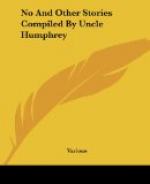“I felt keenly rebuked at this, and resolved never again to permit even the thought of disobedience to find a place in my mind. From that time, I have felt the value of the word no, and have generally, ever since, been able to use it on all right occasions.—It has saved me from many troubles. Often and often in life have I been urged to do things that my judgment told me were wrong: on such occasions I always remembered my first temptation, and resolutely said—
“‘No!’
“And now, my son,” continued Mr. Howland, do you understand the importance of the word No?”
“I think I do, father,” Thomas replied. “But is there not danger of my using it too often and thus becoming selfish in all my feelings, and consequently unwilling to render benefits to others?”
“Certainly there is, Thomas. The legitimate use of this word is to resist evil. To refuse to do a good action is wrong.” “If any one asks me, then, to do him a favor or kindness, I should not, on any account, say, no.”
“That will depend, Thomas, in what manner you are to render him a kindness. If you can do so without really injuring yourself or others, then it is a duty which you owe to all men, to be kind, and render favors.”
“But the difficulty, I feel, will be for me to discriminate. When I am urged to do something by one whom I esteem, my regard for him, or my desire to render him an obligation, will be so strong as to obscure my judgment.”
“A consciousness of this weakness in your character, Thomas, should put you upon your guard.”
“That is very true, father. But I cannot help fearing myself. Still, I shall never forget what you have said, and I will try my best to act from a conviction of right.”
“Do so, my son. And ever bear in mind, that a wrong action is always followed by pain of mind, and too frequently by evil consequences. If you would avoid these, ever act from a consciousness that you are doing right, without regard to others. If another asks you, from a selfish desire to benefit or gratify himself, to do that which your judgment tells you is wrong, surely you should have no hesitation in refusing.”
The precept of his father, enforced when they were about parting, and at a time when his affections for that father were active and intense, lingered in the mind of Thomas Howland. He saw and felt its force, and resolved to act in obedience to it, if ever tempted to do wrong.
On leaving the paternal roof, he went to a neighboring town, and entered the store of a merchant, where were several young men nearly of his own age, that is, between eighteen and twenty. With one of these, named Boyd, he soon formed an intimate acquaintance. But, unfortunately, the moral character of this young man was far from being pure, or his principles from resting upon the firm basis of truth and honor.




